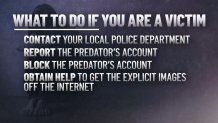The FBI is seeing a huge increase in the number of cases involving children and teens being threatened and coerced into sending explicit images online, and in some cases, culprits threaten to share intimate images or videos if the victims don’t.
In 2022, the FBI received more than 7,000 reports related to online financial sextortion involving a minor, mostly boys.

“A lot of times they think they're talking to a person their own age, maybe somebody who's even interested in engaging in a relationship with them,” Special Agent Fernando Uribe said.
We're making it easier for you to find stories that matter with our new newsletter — The 4Front. Sign up here and get news that is important for you to your inbox.
Scammers make fake profiles and target popular sites, apps, messaging platforms, or games where kids and teens meet and communicate. Once they win over their trust, they ask them to send explicit material.
“They will distribute that, or they will use those same images that were sent to them as a threat,” Uribe said.
Kids are then asked to send money or gift cards to avoid being exposed. They are often too ashamed to report the crime.
Parents can help prevent this from happening, the FBI says.
“They should have a sincere conversation with the minors in their lives about what is appropriate behavior online, and they should report that crime to the FBI if they know about it,” Uribe said. “They should teach children and minors to be very cautious when they're speaking with people they don't know in the real world online.”

Here are a few tips to help a victim:
- Contact your local police department and file a report.
- Report the predator’s account on the platform.
- Block the predator’s account, but do not delete the profile or messages, they can help law enforcement.
- Seek help from the National Center for Missing and Exploited Children to get the explicit images off the internet.
The National Center for Missing and Exploited Children says cooperating or paying the scammers rarely stops the blackmail and harassment continues.
Consumer
Sign up for our Breaking newsletter to get the most urgent news stories in your inbox.


